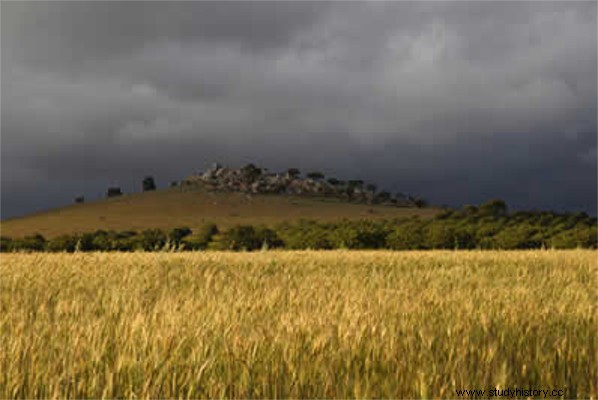
Catarina Efigénia Sabino Eufémia, popularly known in Portugal only as Catarina Eufémia , became a symbol of the struggle against exploitation and repression to which Portuguese workers were subjected during the fascist dictatorship of António Salazar . Born in 1928, in the village of Baleizão, municipality and district of Beja, in the region of Alentejo , Catarina was a rural wage worker, mother of three children. She died on May 19, 1954, also in Baleizão, murdered by a member of the Guarda Nacional Republicana (GNR).
Catarina Eufémia became a symbol of the fight against fascism by participating in a strike carried out in the fields of Alentejo, in May 1954, for the increase in the “journa” (daily salary) that rural workers in the region received. The struggles in the Alentejo countryside had been intensifying since the mid-1940s, and in 1954, before the harvest began, the workers decided to stop activities, taking advantage of a favorable time to put pressure on the bosses, as they needed arms. to perform the harvests.
The demand was an increase in the “journey” from 16 to 23 escudos, which would represent, in 2013, a daily salary increase from 08 to 12 euro cents. Despite paying this salary, which barely guaranteed the workers' survival, the Alentejo bosses refused to accept the demand and hired workers from other regions of the country, thus seeking to break the ongoing strike.
In the village of Baleizão, the workers were mobilized, and Catarina Eufémia, along with 14 other workers, decided to get in touch with a group of workers who had broken the strike, in order to dialogue and win them over to the strikers. As the strike conflict was already intensifying, the GNR had already attended the scene, accompanied by PIDE agents (International State Defense Police), Salazar's political police. Perceiving the approach of women to the group of workers, the GNR questioned the women. There are reports that Lieutenant Carrajola, from the GNR, when questioning them about what they wanted, heard the following response from Catarina Eufémia:“I just want bread and work”. Faced with this response, considered insolent, the lieutenant fired a burst of machine-gun fire. The bullets hit Catarina Eufémia who fell to the ground, with her eight-month-old son who was in her lap, dying in the same place.
Death moved the country, despite all the censorship of the press. Had she not been murdered, Catarina Eufémia would possibly have remained in the anonymity to which thousands of other women and rural workers in Alentejo were subjected. However, the case and its repercussion helped the workers in the region to maintain the decision to continue the resistance against Salazarist violence and fight against the exploitation of the bosses.
The Alentejo region was one of the main places of resistance to the dictatorship of António Salazar, and after the coup of April 25, 1974, Alentejo workers carried out one of the deepest struggles for the improvement of their living conditions, by carrying out an agrarian reform that did not wait for the consent of the State to be carried out. It was in the Alentejo that hundreds of Collective Production Units and production cooperatives were created on idle land occupied by workers, guaranteeing with their work the maintenance of agricultural production in a period of intense social conflicts.
The Portuguese Communist Party (PCP) ended up being the main beneficiary of the memory of Catarina Eufémia's struggle and death, as she was possibly a member of the party when she died. The objective was to maintain the image of a communist Alentejo, a bastion of the party, with support in the figure of the woman who became a martyr for the communists.
